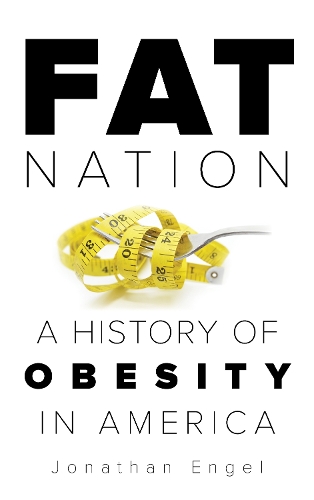
Fat Nation: A History of Obesity in America
(Hardback)
Publishing Details
Fat Nation: A History of Obesity in America
By (Author) Jonathan Engel
Bloomsbury Publishing PLC
Rowman & Littlefield Publishers
30th November 2018
United States
Classifications
General
Non Fiction
Popular medicine and health
Health systems and services
Health: Diets and nutrition
362.196398
Physical Properties
Hardback
216
Width 157mm, Height 238mm, Spine 18mm
426g
Description
The diet and weight-loss industry is worth $66 billion billion!! The estimated annual health care costs of obesity-related illness are 190 billionor nearly 21% of annual medical spending in the United States. But how did we get here Is this a battle we cant win What changes need to be made in order to scale back the incidence of obesity in the US, and, indeed, around the world Here, Jonathan Engel reviews the sources of the problem and offers the science behind our modern propensity toward obesity. He offers a plan for helping address the problem, but admits that it is, indeed, an uphill battle. Nevertheless, given the magnitude of the costs in years of life and vigor lost, it is a battle worth fighting. Fat Nation is a social history of obesity in the United States since the second World War. In confronting this familiar topic from a historical perspective, Jonathan Engel attempts to show that obesity is a symptom of complex changes that have transpired over the past half century to our food, our living habits, our life patterns, our built environments, and our social interactions. He offers readers solid grounding in the known science underlying obesity (genetic set points, complex endocrine feedback loops, neurochemical messengering) but then makes the novel argument that obesity is a result of the interaction of our genes with our environment. That is, our bodies have always been programmed to become obese, but until recently never had the opportunity to do so. Now, with cheap calories ubiquitous (particularly in the form of sucrose), unwalkable physical spaces, deteriorating rituals and norms surrounding eating, and the withering of cooking skills, nearly every American daily confronts the challenge of not putting on weight. Given the outcomes, though, for those who are obese, Engel encourages us to address the problems and offers suggestions to help remedy the problem.
Reviews
This is a comprehensive effort to combine recent history with scientific analysis to explain how American obesity reached its current point and what might be done about it. While a few points will spur debate, the approach is admirably comprehensive and dispassionate. -- Peter Stearns, George Mason University, Professor, George Mason University
This ambitious effort from U.S health and social welfare policy scholar and CUNY professor Engel details the cultural history of U.S. obesity. The author argues that critical changes to the workforce and the decentralization of communities, paired with the introduction of technology, most notably automation, have drastically contributed to a rise in obesity in postWorld World II America. * Library Journal *
Author Bio
Jonathan Engel is professor of health policy and management at the Marxe School of Public and International Affairs at Baruch College, CUNY. He has taught previously at Seton Hall University, the Mailman School of Public Health at Columbia University, and at the School of Public Health at the University of Massachusetts. He served as a staff historian on the Presidents Advisory Committee on Human Radiation Experiments, and as the lead author on multiple HIV needs assessments for the city of Newark. In addition, he has conducted strategic design projects for the Kings County Hospital Center, the United Neighborhood Houses of New York, the Edwin Gould Services for Children and Families, and Creative Cities International. His books include Doctors and Reformers, (2002); Poor Peoples Medicine, (2006); The Epidemic: A History of AIDS, (2006); American Therapy: The Rise of Psychotherapy in the United States, (2008); and Unaffordable: American Healthcare from Johnson to Trump (2018).
